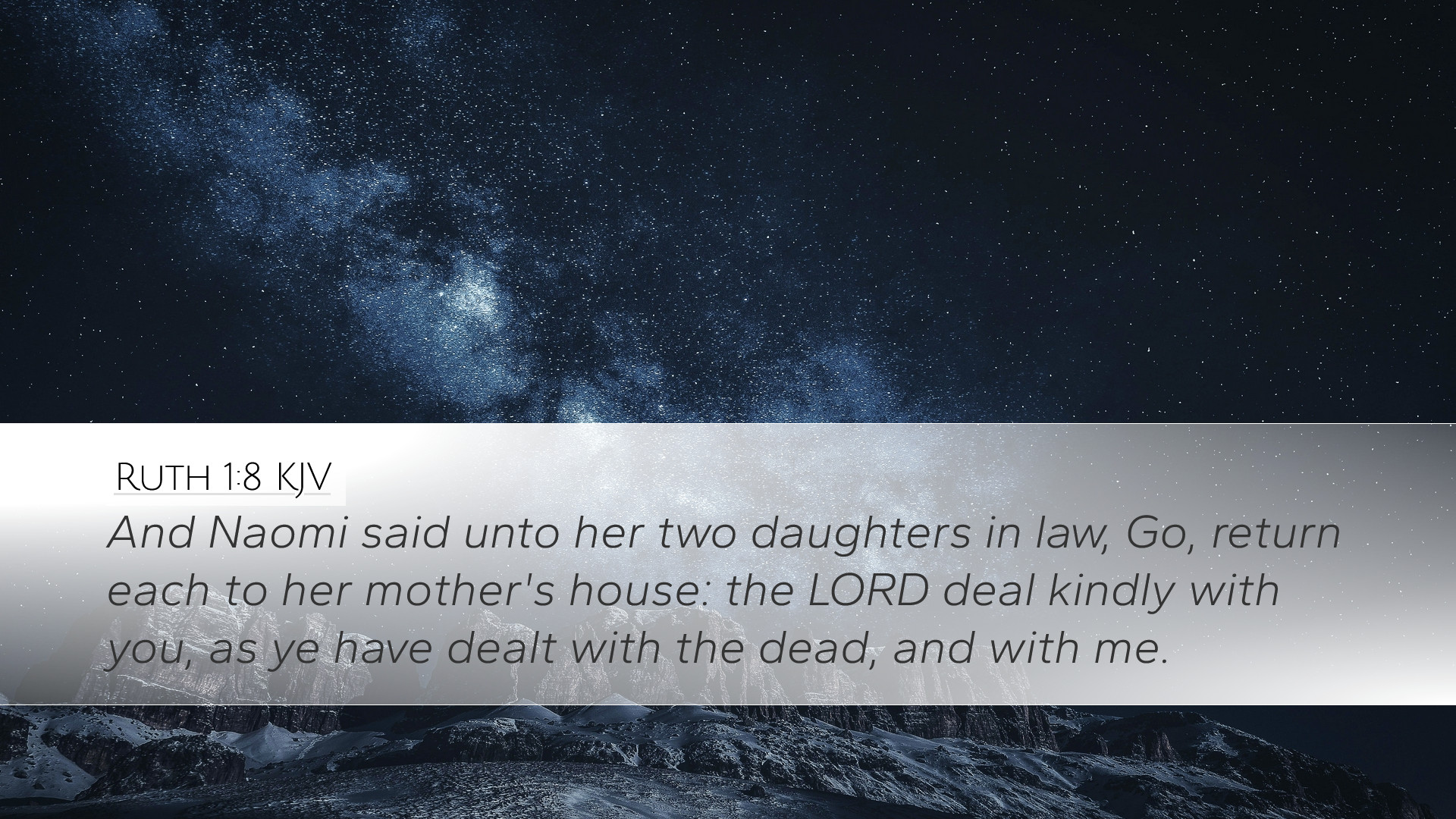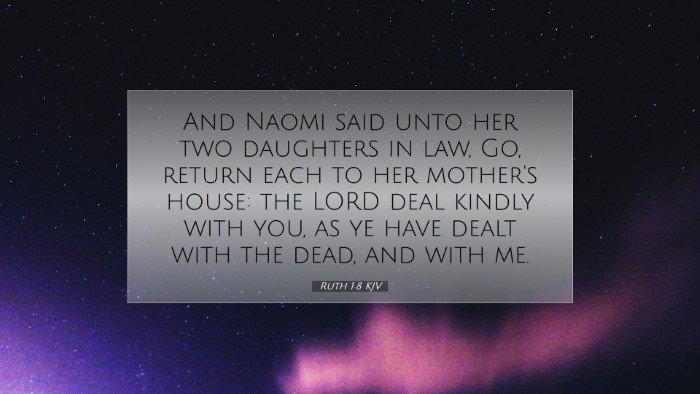Old Testament
Genesis Exodus Leviticus Numbers Deuteronomy Joshua Judges Ruth 1 Samuel 2 Samuel 1 Kings 2 Kings 1 Chronicles 2 Chronicles Ezra Nehemiah Esther Job Psalms Proverbs Ecclesiastes Song of Solomon Isaiah Jeremiah Lamentations Ezekiel Daniel Hosea Joel Amos Obadiah Jonah Micah Nahum Habakkuk Zephaniah Haggai Zechariah MalachiRuth 1:8
Ruth 1:8 KJV
And Naomi said unto her two daughters in law, Go, return each to her mother's house: the LORD deal kindly with you, as ye have dealt with the dead, and with me.
Ruth 1:8 Bible Commentary
Commentary on Ruth 1:8
Ruth 1:8 states:
“But Naomi said to her two daughters-in-law, ‘Go, return each of you to your mother’s house. The Lord deal kindly with you, as you have dealt with the dead and with me.’”
In this passage, we find Naomi as she prepares to return to Bethlehem after the death of her husband and sons. This moment is crucial in the narrative of Ruth, as it sets the stage for the subsequent events that unfold. Here we will draw insights from public domain commentaries to elucidate the theological and practical implications of this verse.
Context and Background
Historical Context: This verse occurs during a time of famine in Israel, leading many families, including Naomi's, to sojourn in Moab where her sons married Moabite women. The cultural prejudice towards Moabites adds a layer of complexity to the interactions between Naomi and her daughters-in-law.
Thematic Significance: Naomi's words reflect themes of loyalty, kindness, and the importance of familial relationships within the broader narrative of redemption in the book of Ruth.
Insights from Commentaries
Matthew Henry's Commentary
Henry emphasizes Naomi’s heartfelt counsel to her daughters-in-law, Ruth and Orpah. He notes that despite her own grief, Naomi exhibits selflessness, urging them to return to their families. This point of her character portrays an essence of true love and concern:
- Selflessness in Suffering: Henry remarks on how Naomi, enveloped in personal loss, prioritizes the future and well-being of Ruth and Orpah, recognizing that their chances of finding new husbands are greater among their own people.
- Divine Kindness: The prayer for the Lord’s kindness to her daughters-in-law showcases Naomi's faith and acknowledgment of God's providence, illustrating her understanding that genuine relationships are inherently blessed by divine favor.
Albert Barnes' Notes on the Bible
Barnes adds depth to this verse by examining the cultural implications of Naomi's request. He notes that returning to one's mother’s house signifies a return to one's roots and familial ties, which were of utmost importance in ancient Near Eastern culture:
- Cultural Expectation: He emphasizes that by advising her daughters-in-law to return to their mothers, Naomi was encouraging them to adhere to their cultural practices, laden with social significance.
- Kindness as a Reflection of Character: Barnes elaborates on the nature of kindness demonstrated by Ruth and Orpah towards Naomi thus far, underscoring the covenant-like fidelity that forms a backbone for the narrative, contrasting with the backdrop of suffering.
Adam Clarke's Commentary
Clarke provides a theological lens that centers on the divine dealings with Naomi and her daughters-in-law. He asserts that Naomi's awareness of the dangers in Moab highlights her wisdom.
- Acknowledgment of God's Providence: Clarke interprets Naomi's plea as an acknowledgment of God's providential love and care—a theme that resonates with readers even today, as they navigate their personal challenges.
- The Meaning of Return: By urging her daughters to return, Naomi highlights the theme of 'returning' which not only serves as a literal action but resonates with a spiritual return to faith, family, and community.
Theological Reflections
The development in Ruth 1:8 opens up a rich field of theological thought that resonates with contemporary audiences:
- The Nature of God’s Kindness: In Naomi’s blessing, there is a theological assertion of God’s kindness and providence. This moment captures the essence of God's dealings with humanity, as one sees in the story of redemption throughout scripture.
- Familial Relationships and Faith: This passage draws a connection between familial fidelity and divine blessings. The relationships depicted can serve as a model for the church community today, demonstrating the importance of encouraging one another in faith during challenging times.
- The Role of Women in Redemption History: Naomi, Ruth, and Orpah exemplify the significant role women play in the lineage of Christ, revealing the integral part they occupy in God’s unfolding plan.
Application for Today’s Believers
This verse invites contemporary believers to reflect on several key areas of personal and communal life:
- Calling of Sacrifice: As Naomi sacrifices her emotional desire for companionship in favor of her daughters-in-law’s future, modern-day believers are called to reflect on their sacrificial love for others.
- The Importance of Community: Just as Naomi advises her daughters to return to their families for support, it serves as a powerful reminder of the need for community in a challenging and isolating world.
- Trusting in God’s Plans: Naomi’s blessing encapsulates a deep-seated faith in God’s plans, beckoning believers today to trust in God’s timing and provision, even when circumstances appear bleak.
Conclusion
Ruth 1:8 is a microcosm of the themes of loyalty, divine providence, and the importance of familial and communal relationships. The insights from various commentaries provide a multi-faceted understanding of the text, applicable to believers today. As pastors, students, and theologians delve into this verse, may they be encouraged to embody the compassionate character of Naomi, embracing and bestowing kindness in a world yearning for love and connection.


